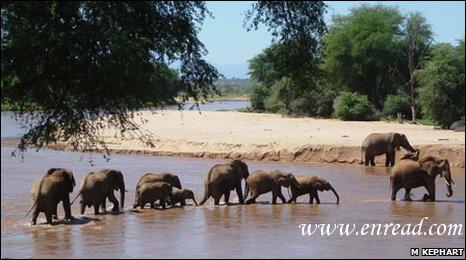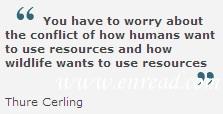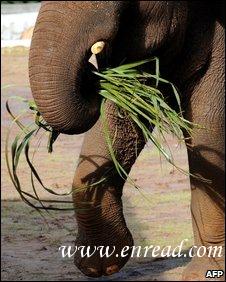| ||||||||||||||||||||||||||||||||||||||||||||||||||||||||||||||||||||||||||||||||||||||||||||||||||||||||
|
The research followed a family of Kenyan elephants for six years The diet and behaviour of elephants evidenced(证明) by the chemical makeup1(组成) of their tail hairs shows how they compete with other species(物种,种类), researchers say. 研究人员称,受饮食和行为影响,大象尾巴上的毛发的组成可以显示它们如何与其他物种相竞争。 The six-year study, published in Proceedings2 of the National Academy of Sciences, followed a single family of elephants in northern Kenya(肯尼亚). The study shows how the elephants lost out to cattle grazing(放牧) on grasses. It also shows the rate of conception(观念,概念) rising as food and water resources become more abundant(丰富的,充裕的) each year. The study is part of an ongoing3(前进的,进行的) research programme tracking the elephant family using GPS receivers on each individual and determining a dietary(饮食的) history from their tail hairs. That history is laid out chronologically4(按年代的) in an "isotope5(同位素) record" along the hair. Isotopes6 are naturally occurring variations(变更) of atoms that are chemically identical but have a slightly different mass. Different food or water sources that the elephants might access(存取) contain different ratios(比率) of isotopes of carbon, hydrogen or nitrogen(氮). The team's prior(较早的,在先的) work in 2006 showed the power of the maxim7 "you are what you eat"; a clear record of the elephants' diets was evident in the proteins that made up their tail hairs. 'Out-competed' "Now, we have a long-term record so we can really see what one normal family is doing over a long period of time," said Thure Cerling, the University of Utah professor who leads the research. In the new work, the team also analysed the content of deuterium(氚) - an isotope of hydrogen - in the elephants' tails to determine the source of the water they drink. "During the dry season, the river they're accessing comes from quite far away, so the water has had a lot of time to evaporate(蒸发) and change its isotope composition," Professor Cerling told BBC News. "Then during the rainy season, the rivers come up and the whole isotope composition changes and we're able to actually see that." But the surprise finding came from one season in which the elephants apparently8 did not eat grasses that should have been readily(迅速的,轻易的) available. "When the rainy season comes you get this big sprouting9(发芽,萌发) of grasses, but they can't access it until it is 30 to 50 centimetres high," Professor Cerling said. "It's got to grow tall enough before they can actually yank(猛拉,猛拔) it off with their trunks. "We have this one incident where they apparently missed an entire good season of grass resource; the GPS data shows that they were outside [Samburu National Reserve] in a community area where it appears that they had to compete with cattle. "They got out-competed in that situation." The team also noted10 that conceptions rose sharply just a few weeks after the rainy season brought abundant food and water. "They bulk(胀大) up during the rainy season, get into good condition, right as things are starting to get good," Professor Cerling explained. What is more, the elephants' 22-month gestation11(怀孕,孕育时期) period means that the maximum birthing period is shortly before things get good again. "That's right when they have adequate(足够的,充足的) water and just about the right time to access this high-protein grass source," he added. Future conflicts The approach gives an intimate(亲密的,私人的) look into the elephants' behaviour and diet in a way that traditionally could not be done. While that is of tremendous academic interest to wildlife ecologists, Professor Cerling says the recent findings point to an imminent12(逼近的,即将发生的) problem of broader interest. "It points out you have to worry about the conflict of how humans want to use resources and how wildlife wants to use resources," he says. "As we have global climate change, that's going to change the available resources. As you have populations increase - and all African populations are increasing dramatically - then you'll have more competition for the resources. "If you're concerned about preservation13(保存,维护) of wildlife then you have to worry about that competition." 点击  收听单词发音 收听单词发音
|
||||||||||||||||||||||||||||||||||||||||||||||||||||||||||||||||||||||||||||||||||||||||||||||||||||||||
上一篇:能在水上“散步”的动物 下一篇:苍蝇也有自己的“领空”吗? |
||||||||||||||||||||||||||||||||||||||||||||||||||||||||||||||||||||||||||||||||||||||||||||||||||||||||
- 发表评论
-
- 最新评论 进入详细评论页>>






